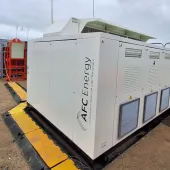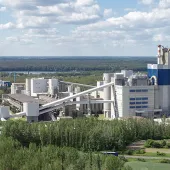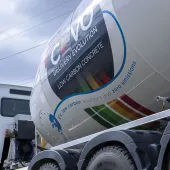Paving the Way to Lower-Carbon Asphalt

First published in the January 2022 issue of Quarry Management
By Dr Ian M Lancaster, UK technical manager, Nynas Bitumen
The performance benefits of polymer-modified bitumen (PMB) are well documented and there is strong evidence that, due to the reduction in stress mechanisms such as permanent deformation and cracking, the lifetime of asphalt produced using these binders can be significantly extended. The overall carbon footprint during the lifetime of the pavement is also reduced due to a reduction in maintenance interventions. It is, however, unfortunate that the incorporation of synthetic polymers into bitumen can significantly increase the cradle-to-gate carbon footprint. Incorporation of renewable carbon (also known as biogenic) materials into polymer-modified bitumen can, however, significantly reduce the carbon footprint.
During a webinar hosted in September 2021, Nynas unveiled a range of high-performance, polymer-modified bitumens incorporating biogenic materials which can bring lower carbon and extended lifetime to asphalt. The biogenic material incorporated in these new, high-performance binders is a sustainably sourced by-product of the wood-pulping process, known as tall oil pitch (TOP).
Following extensive laboratory and site trials in Sweden, the new range of TOP-modified binders is about to be introduced to the UK. These new binders have equivalent properties to their conventional counterparts and have the added benefit of increased resistance to ageing, giving the binder ‘longer life’ (see fig. 1). The performance of the new binders was also evaluated in asphalt mixtures, with a focus on stiffness, fatigue resistance, and permanent deformation. Performance equivalence to the conventional PMB counterpart was observed, but with the additional benefit of improved adhesion to many aggregates.
Field trials carried out in Sweden between 2016 and 2018 demonstrated that binders containing TOP will mix, pave, and compact just as well as, if not better than, equivalent non-biogenic binders. The performance of these field trials has been extensively monitored since installation with no evidence of distress to date. More recent field trials demonstrated that recycled asphalt planings (RAP) can easily be incorporated into asphalt mixtures produced using TOP-modified binders. These field observations have been backed-up by extensive research at the University of Ancona, in Italy.
The recyclability and reusability of bituminous binders and asphalt is well documented. Being non-biodegradable, or persistent, in the environment means that bituminous binders are not converted into carbon dioxide in service. Incorporating biogenic materials into bituminous binders does not affect the biodegradability or recyclability of these materials. Therefore, asphalts produced with TOP-modified binders are 100% recyclable and do not affect the circularity of conventional asphalt.
Using well-established and independently verified data, Nynas have calculated that the incorporation of biogenic materials into polymer-modified bitumen effectively negates the carbon contribution associated with the polymer (fig. 2). This effectively means that Nynas’ TOP-modified PMBs can have an equivalent carbon footprint to that of a paving-grade bitumen. Further benefits are realized when the higher performance and extended lifetime of asphalts produced with modified PMBs are taken into consideration: a 25% reduction in embodied CO2 is achieved with a 33% increase in life compared with a requirement of 52% increase in life for a conventional PMB (fig. 3), or at equal increase in life of 52%, the modified PMB comes with an additional 10% reduction in embodied CO2.
- Subscribe to Quarry Management, the monthly journal for the mineral products industry, to read articles before they appear on Agg-Net.com








